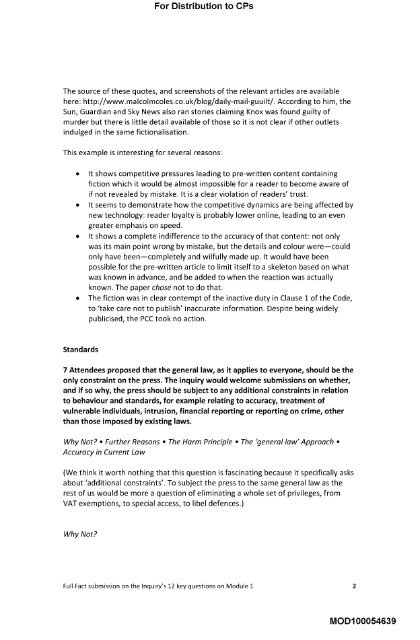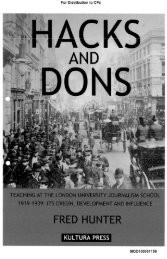Third Submission by Full Fact - The Leveson Inquiry
Third Submission by Full Fact - The Leveson Inquiry
Third Submission by Full Fact - The Leveson Inquiry
You also want an ePaper? Increase the reach of your titles
YUMPU automatically turns print PDFs into web optimized ePapers that Google loves.
For Distribution to CPs<br />
<strong>The</strong> source of these quotes, and screenshots of the relevant articles are available<br />
here: http://www.malcolmcoles.co.uk/blog/daily-mail-guuilt/. According to him, the<br />
Sun, Guardian and Sky News also ran stories claiming Knox was found guilty of<br />
murder but there is little detail available of those so it is not clear if other outlets<br />
indulged in the same fictionalisation.<br />
This example is interesting for several reasons:<br />
¯ It shows competitive pressures leading to pre-written content containing<br />
fiction which it would be almost impossible for a reader to become aware of<br />
if not revealed <strong>by</strong> mistake. It is a clear violation of readers’ trust.<br />
¯ It seems to demonstrate how the competitive dynamics are being affected <strong>by</strong><br />
new technology: reader loyalty is probably lower online, leading to an even<br />
greater emphasis on speed.<br />
¯ It shows a complete indifference to the accuracy of that content: not only<br />
was its main point wrong <strong>by</strong> mistake, but the details and colour were--could<br />
only have been--completely and wilfully made up. It would have been<br />
possible for the pre-written article to limit itself to a skeleton based on what<br />
was known in advance, and be added to when the reaction was actually<br />
known. <strong>The</strong> paper chose not to do that.<br />
¯ <strong>The</strong> fiction was in clear contempt of the inactive duty in Clause 1of the Code,<br />
to ’take care not to publish’ inaccurate information. Despite being widely<br />
publicised, the PCC took no action.<br />
Standards<br />
7 Attendees proposed that the general law, as it applies to everyone, should be the<br />
only constraint on the press. <strong>The</strong> inquiry would welcome submissions on whether,<br />
and if so why, the press should be subject to any additional constraints in relation<br />
to behaviour and standards, for example relating to accuracy, treatment of<br />
vulnerable individuals, intrusion, financial reporting or reporting on crime, other<br />
than those imposed <strong>by</strong> existing laws.<br />
Why Not? ¯ Further Reasons ¯ <strong>The</strong> Harm Principle ¯ <strong>The</strong> "general law" Approach ¯<br />
Accuracy in Current Law<br />
(We think it worth nothing that this question is fascinating because it specifically asks<br />
about ’additional constraints’. To subject the press to the same general law as the<br />
rest of us would be more a question of eliminating a whole set of privileges, from<br />
VAT exemptions, to special access, to libel defences.)<br />
Why Not?<br />
<strong>Full</strong> <strong>Fact</strong> submission on the <strong>Inquiry</strong>’s 12 key questions on Module 1<br />
MOD100054639
















